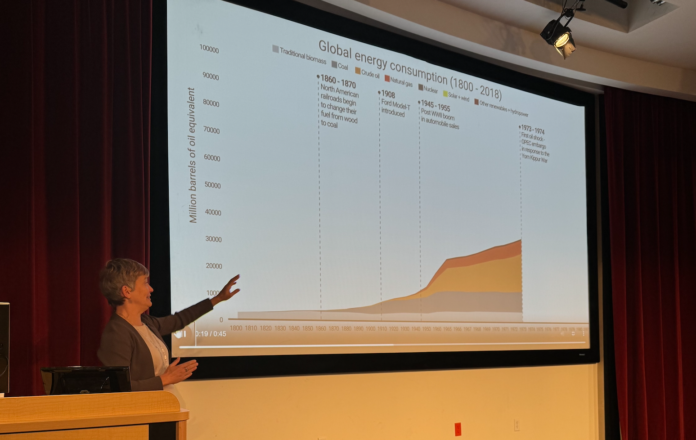
Samantha Gross shed light to UNLV students on why the transition away from fossil fuels is slower than many expected.
Gross, technically trained as an engineer, has worked in both the private sector, working with oil companies to encourage them towards sustainability, and in the government, working for the Department of Energy under President Barack Obama’s administration. Now, Gross works at The Brookings Institution.
On the topic of visiting UNLV, Gross noted, “I really enjoy working with and talking with students. I love to hear the questions you all have. It helps me understand what people understand and what they want to understand better. It’s kind of fun to work with students. It’s also true that I was a first-generation college student too; I didn’t know that jobs like mine existed, and so I see myself in a lot of the people here.”
In the lecture, Gross showed the first major historical transition of energy from coal to oil in a graphic. In the transition, Gross pointed out how humans never completely stopped using coal; it was just that oil and natural gas took up a larger percentage of energy consumption.
Gross pointed to a couple of reasons why transitioning from fossil fuels is taking longer than how many have expected. There are a few qualities to fossil fuels that are difficult to replace and replicate, Gross argues. Firstly, batteries are heavy, which are a detriment when it comes to aviation. Having solar powered planes carry batteries that are heavier than fuel seems more inefficient compared to carrying lighter and easily transported fuel on planes. Second, the heat generated from burning fossil fuels is so hot that it can be used to create cement and glass. In certain sectors, a de-transition from fossil fuels would not be possible, but for on the ground transportation such as electric vehicles, Gross encourages that transition. “[Electric cars] are zippy,” she joked.
Gross also encouraged the shift away from “doom and gloom” messaging around the climate. Messaging around the climate that implies an end to the world is not effective in encouraging action. At the same time, messaging that denies that climate change is real is also not effective. Gross said, “The fact that the earth is getting warmer is as certain as gravity…The biggest problem we face here is political … We need different stories.”
Maryam Raja, a political science and public policy student, says, “I enjoyed the Brookings Mountain West lecture with Samantha Gross. I learned how the environmental sector works hand in hand with other sectors like national defense, etc. Also, [we learned about] efficient alternatives to fossil fuels and how they are more important than fully stopping our use of them. Although [it is] unfortunate, that doesn’t mean there won’t be innovative ways of finding electrical based solutions or creating more efficient [energy].”
Gross gave advice for students looking to break into the energy industry, saying, “I think a lot of people think that the energy space is specifically [designed for people in] STEM. And there are plenty of stem jobs, but if the space is interesting to you, you don’t have to be a scientist or an engineer … STEM is great and if that’s you, great. Go for it. But you don’t have to be that to find a home in this space. There are other jobs too. And that’s the advice I have: you can do what you’re good at then apply it to a cause you care about.”Gross’ lecture will be available to watch on the Brookings Mountain West Youtube Channel. On Nov. 7, Brookings Mountain West will host Molly Brown, who will speak on women in the workforce, from 6 p.m. to 7 p.m.
